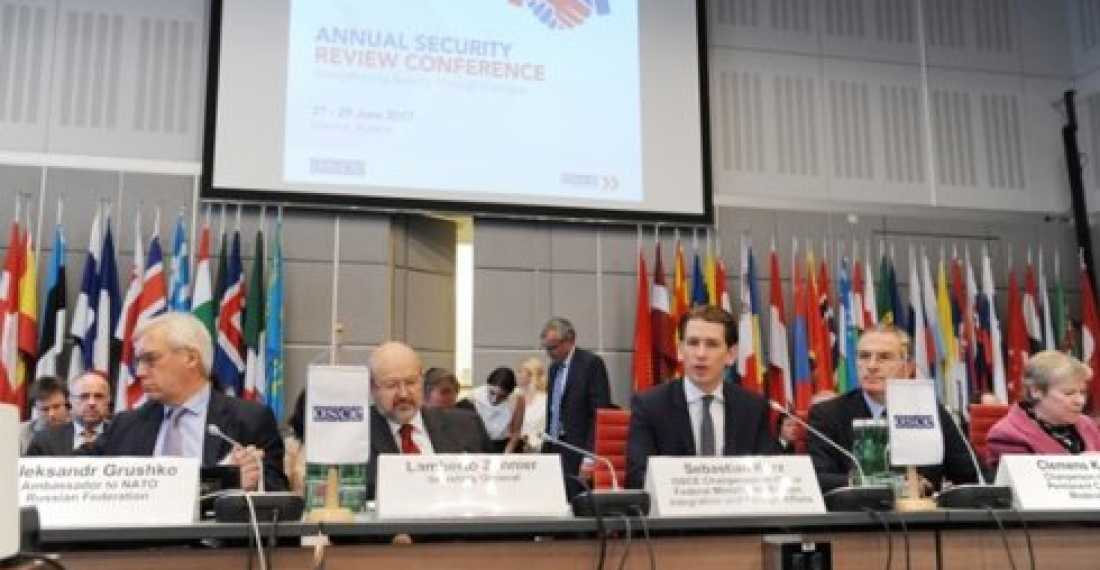This is a commonspace.eu editorial comment
The Annual Security Review Conference in the framework of the OSCE - the Organisation for Security and Co-operation in Europe - provides a yearly opportunity for diplomats and military experts from the 57 member states of the organisation to take stock of the security situation in Europe. It receives hardly any media attention, but it does provide the opportunity for the bureaucrats to be exposed to opinions from civil society actors, such as think tanks and NGOs. This year's conference took place in Vienna 27-29 June, and was opened by Austrian Foreign Minister Sebastian Kurz, who is also the current Chairman-in-Office of the organisation.
The atmosphere at the Hofburg Palace during this year's proceedings was rather sombre. Kurz himself, one of Europe's youngest foreign ministers, set the tone in his opening remarks saying that his generation grew up thinking that war in Europe was a thing of the history books, but different crises on the continent had shattered this illusion. Kurz reminded the audience that the conflict in Ukraine had resulted in more than 10,000 casualties, and 38 million people needed humanitarian aid as a result of the conflict.
The extent to which the situation in Ukraine has cast a dark cloud over Europe was clearly seen in Vienna this week. There were harsh words for Russia, and delegation after delegation lined up to denounce Russia's annexation of Crimea and its meddling in the Donbass. Russian diplomats were unruffled. "We have our interests" they insisted, accusing western countries of trying to encroach on Russia's security. Peace in Europe since the 1975 Helsinki Final Act has been held together by a series of treaties and agreements aimed at controlling the proliferation of arms, reducing misperception and providing for confidence between adversaries. The end of the cold war in 1991 was hailed as a new beginning, but Russia claims that the situation that ensued created new dangers to its security. Its new assertiveness, and the war in Georgia in 2008 and the crisis in Ukraine since 2013 have unsettled its neighbours. Many of the agreements now need renewal, and those that remain in force are often violated.
Referring to this, Lamberto Zannier, OSCE Secretary General, said one of the major objectives is to identify avenues to overcome the long-standing impasse in the discussions on conventional arms control and confidence- and security-building measures.
"We really have no choice but to intensify our efforts to find ways for pragmatic engagement on common challenges and to pursue the long-term aim of reviving co-operative security as we once knew it," said Zannier
Whilst experienced diplomats do not think a large continental war is likely, there are concerns that incidents can escalate quickly. Russia and some other countries are accused of failing to give prior warning of large scale military manoeuvres.
Within the framework of the OSCE there have been several attempts to try to reverse the trend, including an on-going initiative called "structured dialogue". Referring to this, Lamberto Zannier, OSCE Secretary General, said that one of the Structured Dialogue's major objectives is to identify avenues to overcome the long-standing impasse in the discussions on conventional arms control and confidence- and security-building measures."We really have no choice but to intensify our efforts to find ways for pragmatic engagement on common challenges and to pursue the long-term aim of reviving co-operative security as we once knew it," said Zannier.
But whilst diplomats fret on the minutiae in Vienna, back in the capitals the politicians have yet to find the will to engage in the sort of hard political negotiations that are now clearly required. The OSCE therefore finds itself with the thankless task of trying to keep the lid on a number of crises - from Ukraine to Georgia, from Nagorno-Karabakh to Transdniestr, with hardly any prospect of a solution in sight.
The time has come for a major new initiative - a 21st century version of the Helsinki Final Act, and while this will be hard and difficult to achieve it is necessary that European leaders make a commitment to move towards this, with a view to at least launch the process by 2020. If not, the likelihood that the security situation in Europe will continue to deteriorate is high, with all the risks attached with that.
source: commonspace.eu
photo: Austrian Foreign Minister Sebastian Kurz opening the Annual Security Review Conference of the OSCE in Vienna on 27 June 2017 (picture courtesy of the press service of the OSCE)






